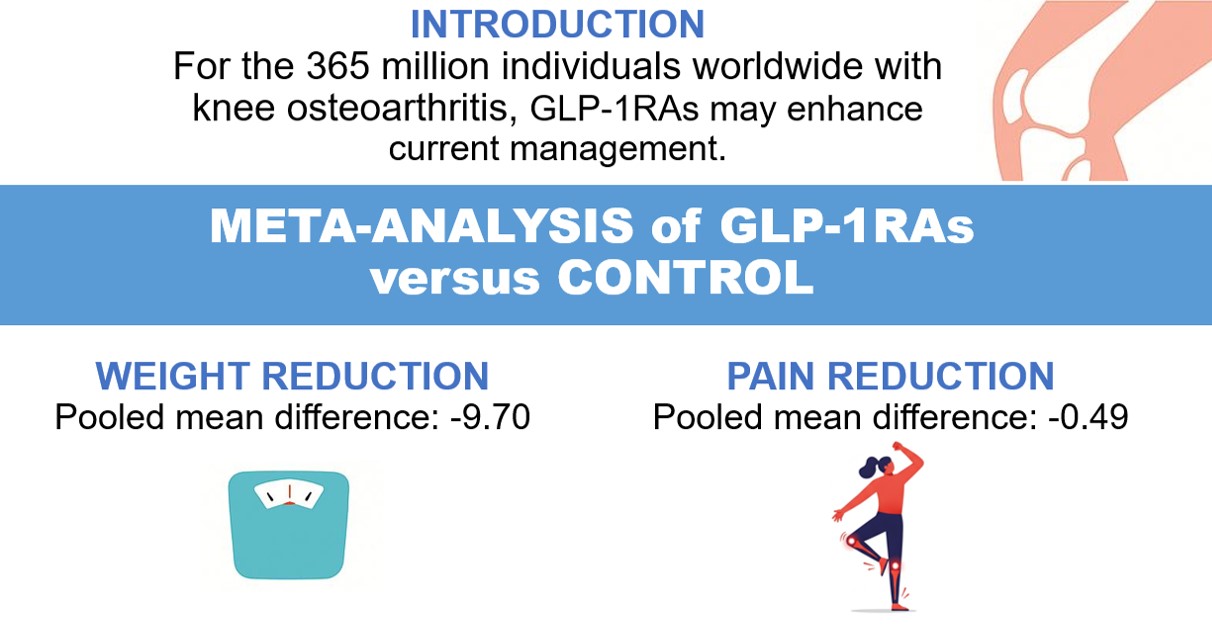Session Information
Session Type: Poster Session A
Session Time: 10:30AM-12:30PM
Background/Purpose: Knee osteoarthritis (KOA) is a leading cause of disability and the most common rheumatological condition worldwide. Weight management has been recognized as a key modifiable factor in disease progression and symptom burden. Glucagon-like peptide-1 receptor agonists (GLP-1RAs), primarily used for diabetes and weight loss, may offer additional benefits in KOA through weight reduction and improved joint function. We conducted a meta-analysis of GLP-1RAs versus control interventions in patients with KOA.
Methods: We included two studies — Semaglutide Treatment Effect in People with obesity (STEP) 9, a randomized controlled trial, and the Shanghai Osteoarthritis Cohort (SOC), a large observational cohort — reporting outcomes in body weight and Western Ontario and McMaster Universities Osteoarthritis Index (WOMAC) domains. Both studies utilized GLP-1RAs as their experimental variable. Data was pooled using random-effects models and heterogeneity was assessed using the I² statistic.
Results: GLP-1RA therapy led to a pooled reduction in body weight of -9.70 kg (95% CI -14.51 to -4.89; I² = 95.8%). For the WOMAC pain score, the pooled mean difference (MD) was -0.49 points (95% CI -0.61 to -0.38; I² = 0.0%), reflecting improvement in symptoms. Physical function demonstrated a pooled standardized mean difference (SMD) of –1.29 (95% CI -3.79 to 1.21; I² = 99.6%). For the total WOMAC score, the pooled SMD was –0.30 (95% CI -0.77 to 0.17; I² = 92.9%), and for WOMAC stiffness, the pooled SMD was -0.23 (95% CI –0.64 to 0.18; I² = 90.9%). Despite variable heterogeneity, the direction of benefit consistently favored GLP-1RAs across all domains.
Conclusion: GLP-1RAs appear to reduce pain in patients with knee osteoarthritis, likely through weight reduction. Changes in physical function and stiffness have been reported with varying significance and should be assessed more in-depth. While the magnitude of effect varied across primary end-points and studies, the consistent direction of benefit supports further investigation of GLP-1RAs as adjunctive therapy in KOA management.
 The aggregate mean difference between GLP-1RA use and control for body weight. Presented as a forest plot.
The aggregate mean difference between GLP-1RA use and control for body weight. Presented as a forest plot.
.jpg) The aggregate mean difference between GLP-1RA use and control for reported pain on WOMAC index. Presented as a forest plot.
The aggregate mean difference between GLP-1RA use and control for reported pain on WOMAC index. Presented as a forest plot.
.jpg) Graphic depicting the focus of the meta-analysis and its primary end-points.
Graphic depicting the focus of the meta-analysis and its primary end-points.
To cite this abstract in AMA style:
Madison D, Morales Rivera A, Collins D, Lam I, Khokhar D, Snyder G, Thompson A, Soliman M, Carralero Somoza D, Sabina M. Glucagon-like Peptide-1 Receptor Agonists in Management of Knee Osteoarthritis: A Meta-Analysis [abstract]. Arthritis Rheumatol. 2025; 77 (suppl 9). https://acrabstracts.org/abstract/glucagon-like-peptide-1-receptor-agonists-in-management-of-knee-osteoarthritis-a-meta-analysis/. Accessed .« Back to ACR Convergence 2025
ACR Meeting Abstracts - https://acrabstracts.org/abstract/glucagon-like-peptide-1-receptor-agonists-in-management-of-knee-osteoarthritis-a-meta-analysis/
